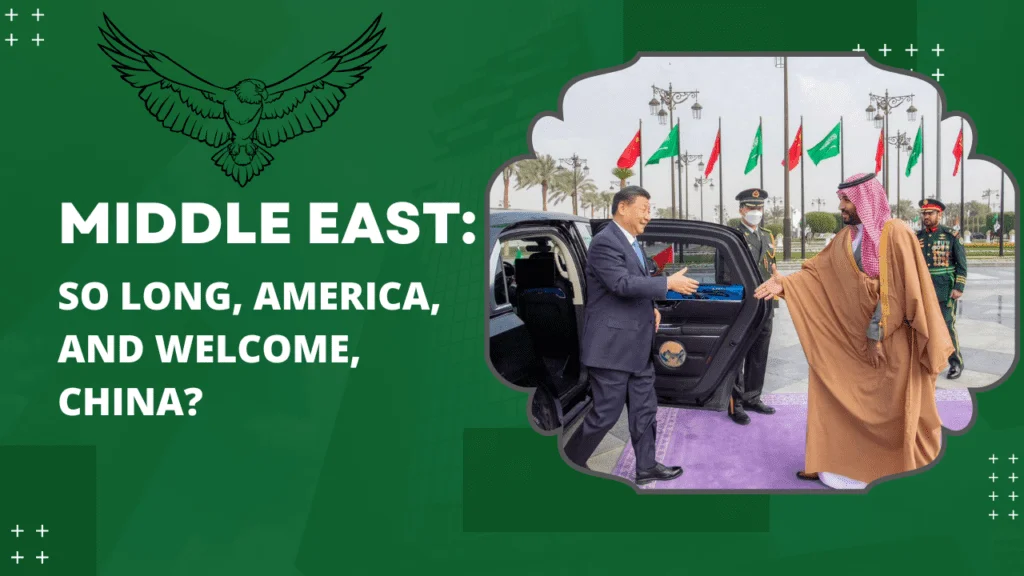This week, US Secretary of State Antony Blinken will embark on a three-day trip to Saudi Arabia in an attempt to bolster his country’s waning influence in the Middle East. However, advancing “strategic cooperation” with his Saudi and Gulf counterparts could prove to be a formidable challenge.
President Joe Biden attended the Gulf Cooperation Council summit in Saudi Arabia last July and vowed that the United States “will not walk away and leave a vacuum for China, Russia, or Iran to fill.” However, this is precisely what has been occurring.
Despite US objections, its regional allies have adopted a hybrid strategy over the past year, improving relations with Beijing and Tehran while maintaining strong ties with Moscow.
Although the Biden administration has publicly downplayed the significance of the recent Chinese-brokered Saudi-Iranian agreement to re-establish diplomatic relations, it appears frantic over China’s increasing influence in the oil-rich Gulf region and the wider Middle East.
Over the past two decades, the United States has substantially increased its oil and gas production, achieving energy independence. It may no longer require as much oil from the Gulf, but it insists on maintaining control in the region so it can shut off China’s vital energy supplies in the event of a conflict and secure them for its allies.
As Blinken warned a month ago, “China represents the most consequential geopolitical challenge we face today: a country with the intent and, increasingly, the capability to challenge our vision for a free, open, secure, and prosperous international order.”
However, Beijing’s autocracy may be a better match for the region’s autocrats than the democracy in Washington.
Russia’s influence in the Middle East and beyond has made the United States anxious.
Fed up with their ambiguity and even complicity with Russia, the Biden administration has increased pressure on a number of Middle Eastern states, making it plain that its patience is wearing thin. It has warned nations in the region against assisting Russia in evading sanctions and demanded that they choose a side or face the wrath of the United States and G7 nations.
But to no avail.
Saudi Arabia has thus far declined the United States’ request to significantly increase oil production in order to reduce its market price and mitigate the impact of Western sanctions on Russia. It has maintained cordial relations with Moscow while delaying support for Ukraine. According to reports, Saudi Crown Prince Mohammed bin Salman’s “middle finger to Washington” has earned him immense popularity in the region.
In response to Vice President Biden’s threats to punish Riyadh for its presumed insolence, the monarchy hosted Chinese President Xi Jinping for bilateral talks as well as the China-GCC and China-Arab summits last year. Saudi Arabia subsequently normalized relations with Iran under Chinese auspices, just as the West was tightening sanctions against Tehran, and in a clear rebuke to the United States, went on to restore ties with Syria.
However, this new attitude toward relations with the United States is not unique to Riyadh; it is a regional phenomenon. The United Arab Emirates, another US ally, has also worked to strengthen ties with China, France, and Iran, Russia, and India. This has occasionally harmed its relations with the United States.
Overall, the region is diversifying its global engagement. This is quite apparent in its commercial relations. Between 2000 and 2021, trade between the Middle East and China increased from $15.2 billion to $284.3 billion, while trade with the United States grew only modestly, from $63.4 billion to $98.4 billion.
Six Middle Eastern nations, including Saudi Arabia, the United Arab Emirates, and Egypt, have recently asked to join the Chinese-led BRICS group, which also comprises Russia, India, Brazil, and South Africa. This is despite the expanding sanctions regime imposed on Russia by the West.
The United States has been and continues to be the preeminent strategic power in the Middle East for the past three decades. But will it occur within the next thirty years?
In a region where autocratic regimes and the general populace do not concur on much, saying no to the United States is a very popular stance because the majority considers it to be a hypocritical imperial power that only pays lip service to human rights and democracy.
This is especially evident in US foreign policy toward Palestine, which staunchly and unconditionally supports Israel, the colonizer and occupier of the Palestinians.
On his trip to Riyadh, Secretary Blinken will likely exert pressure on Saudi Arabia to normalize relations with Tel Aviv in an effort to reduce the kingdom’s asking price, which reportedly includes a civilian nuclear program and significant security guarantees.
The United Arab Emirates, Bahrain, Morocco, and Sudan have already normalized relations with Israel at the expense of the Palestinians in exchange for American concessions, such as the sale of US-made F-35s to Abu Dhabi, US recognition of Moroccan claims over Western Sahara, and the lifting of US sanctions on Khartoum. All so that the Israeli government can terminate its decades-long occupation of Palestine without making any “concessions” of its own.
But the Palestinian cause, which is quite near to the hearts of average Arabs, is not the only issue that has persuaded the Arab public that the United States is a deceitful power that should be avoided.
Due to satellite television and social media platforms, the people of the region witnessed the United States’ atrocities in Iraq and its humiliation in Afghanistan, and they no longer view it as a defender of civilization, let alone an invincible force. Since the terrorist attacks of September 11, 2001, the United States’ interventions in the Middle East over the past two decades have been decidedly unprofitable.
In a 2022 survey conducted in 14 Arab countries by the Arab Center for Research and Policy Studies in Doha, Qatar, 78% of respondents believed that the United States posed the greatest threat and instability to the region. In contrast, only 57% of respondents viewed Iran and Russia in the same light, despite the fact that both countries have done their fair share of filthy work in the region, from Syria to Iraq and Yemen.
In his book appropriately titled Grand Delusion: The Rise and Fall of American Ambition in the Middle East, former US official Steven Simon estimates that the United States has wasted between $5 trillion and $7 trillion on conflicts that have resulted in the deaths of millions of Arabs and Muslims and the destruction of their communities. In addition, these conflicts have resulted in the deaths of thousands of US combatants, the injuries of tens of thousands, and the suicides of approximately 30,000 US veterans.
It is therefore not a coincidence that more Middle Easterners (and Americans) concur that the region’s decoupling from the United States and at least a partial American withdrawal from the region is both desirable and inevitable.
It would depend on whether and how the United States decides to alter its foreign policy whether or not such a turn of events would have disastrous long-term consequences for both sides.
But that is a topic for a different day.









Comments are closed.